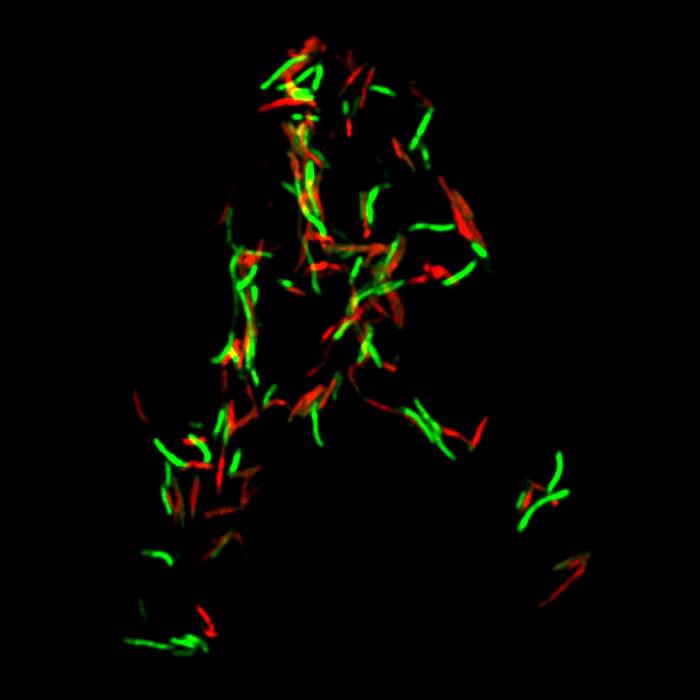
Credit: Antonio Peixoto, Claude Gutierrez, and Olivier Neyrolles | IPBS | CNRS/UPS
The bacteria responsible for tuberculosis can be killed by a toxin they produce unless it is neutralized by an antidote protein. The European team of scientists behind this discovery is coordinated by researchers from the Institute of Pharmacology and Structural Biology (IPBS–CNRS/UPS) and the European Molecular Biology Laboratory (EMBL). (1) Their findings are published in Molecular Cell (February 18, 2019). The team is now seeking to appropriate this “suicide” mechanism for therapeutic purposes.
Bacteria synthesize molecules that are toxic to themselves. When exposed to a harsh environment, these toxins slow the growth of the bacterial population until more favorable conditions develop. Some toxins even kill the bacteria that produced them. The biological purpose of this “suicide” is still a subject of debate. It may function as an antiviral defense mechanism, killing infected bacteria to spare uninfected neighbors. Or, when faced with nutrient scarcity, it may serve to “sacrifice” a few for the benefit of the many. Under normal conditions, bacteria produce antidote proteins that neutralize the toxins.
The researchers have identified one such “suicide toxin,” called MbcT, in the bacteria responsible for tuberculosis, Mycobacterium tuberculosis. If not thwarted by its antitoxin, MbcA, the MbcT toxin will kill M. tuberculosis by breaking down its store of NAD–a small molecule critical to sustaining life–through a newly identified reaction.
The team of researchers led by Olivier Neyrolles, a CNRS researcher at the IPBS, has demonstrated the therapeutic potential of this toxin. They infected human and mouse cells with a strain of M. tuberculosis lacking this toxin/antitoxin system–but in which they could artificially trigger production of the MbcT toxin. Toxin activation drastically reduced the number of bacteria infecting the cells and increased the mouse survival rate.
These findings pave the way for a novel treatment targeting tuberculosis, which remains one of the top ten causes of death worldwide. And the antibiotic resistance developed by certain strains of Mycobacterium tuberculosis only underscores the urgency. The EMBL researchers have already determined the 3D structure of the MbcT-MbcA complex, and the different teams are now striving to identify compounds that can free the toxin from the antidote with which it is coupled. These molecules may also help fight other infectious diseases because analogous toxin/antitoxin systems have been detected in other pathogenic bacteria.
###
The French National Research Agency (ANR), the Fondation pour la Recherche Médicale (FRM), and the Fondation Bettencourt Schueller all helped fund these investigations.
Notes:
(1) Team jointly led by researchers from the IPBS (CNRS/UPS) and the EMBL (Hamburg, Germany), and including researchers from the Francis Crick Institute (United Kingdom) and the Laboratory of Microbiology and Molecular Genetics (CNRS/UPS) at the Center for Integrative Biology of Toulouse (CNRS/UPS).
Media Contact
Veronique Etienne
[email protected]
33-144-965-137
Original Source
http://www.
Related Journal Article
http://dx.




